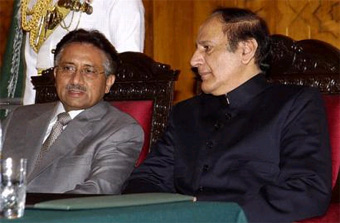|
New Pakistan PM takes office
(Agencies)
Updated: 2004-06-30 21:51
Chaudhry Shujaat Hussain took the oath of office as prime minister Wednesday
as part of a government transition hailed by Pakistan's military ruler as
historic but derided by the opposition as an affront to democracy.

Pakistani President
Pervez Musharraf, left, talks to the newly appointed Prime Minister
Chaudary Shujaat Hussain during the swearing in ceremony, Wednesday, June
30, 2004 at Presidential palace in Islamabad, Pakistan.
[AP] |
Hussain was sworn in by President Gen.
Pervez Musharraf at a ceremony at the presidential palace in Islamabad, one day
after lawmakers endorsed his appointment in a rubber-stamp vote.
Hussain is expected to stay as premier only for a matter of weeks. Ruling
party officials say Finance Minister Shaukat Aziz is to assume the prime
minister's spot once expected political maneuvering is completed.
Musharraf also swore in a 27-member Cabinet on Wednesday. State-run radio
reported two new ministers had taken office, but didn't mention their
portfolios. The key ministerial positions including foreign affairs, defense,
interior and information were unchanged. Aziz was sworn in again as finance
minister.
Opposition lawmakers complain that the process is being manipulated behind
the scenes by Musharraf, the nation's ultimate powerbroker. They say it
underlines the lack of real democracy in this country, five years after the
general took power in a coup.
Hussain replaces Zafarullah Khan Jamali, who had served for 19 months but had
reportedly fallen out with Musharraf. He tendered his resignation Saturday,
without giving a reason.
After his swearing in, Hussain said he would continue Musharraf's policies
for the stability of the economy and improvement of law and order.
Musharraf hailed the peaceful change in prime ministers as historic in a
country with a turbulent political past.
"The opposition should be fully happy that power has been transferred so
smoothly and democracy is working well," he told reporters.
However, an opposition lawmaker of former prime minister Benazir Bhutto's
Pakistan People's Party dismissed Musharraf's claim.
"The power still rests where it was before the removal of Jamali as prime
minister ... with the man whose name if Musharraf," said Sen. Raza Rabbani.
"There is no transfer of power, and only an actor has been changed."
"And let me say that this change is not a matter of pride or joy for any
democrat."
Hussain, the head of the ruling Pakistan Muslim League-Q party, was easily
elected to the premiership by the lower house, the National Assembly, in a
190-to-76 vote over his only challenger. Parliament is dominated by lawmakers
loyal to Musharraf.
Hussain was due to take a vote of confidence in parliament later Wednesday,
seen as a formality.
Aziz, an international banker, is widely believed to be favored by Musharraf.
Aziz is credited with salvaging Pakistan's near-bankrupt economy after
international sanctions were imposed in 1998 in reaction to the testing of
nuclear missiles.
PML-Q party officials have said Aziz, a member of the upper house, or Senate,
will be nominated as premier once he secures a seat in the lower house, a
requisite for any candidate as prime minister.
Information Minister Sheikh Rashid Ahmed said Hussain was expected to
announce on Wednesday a constituency where Aziz will stand in a by-election — a
move requiring a ruling party loyalist to resign from a National Assembly seat.
The change in prime ministers was unlikely to alter Pakistan's commitment to
either the U.S.-led war on terror or fledgling peace talks with nuclear rival
India — matters that are firmly in Musharraf's hands.
Real authority rests with Musharraf, who took power in a bloodless coup in
1999 and has since decreed changes to the constitution that empower him to
dismiss the prime minister and parliament.
| |
 |
|
 |
|
|
Today's
Top News |
|
|
|
Top World
News |
 |
|
 |
|
|
|
|
|
|


